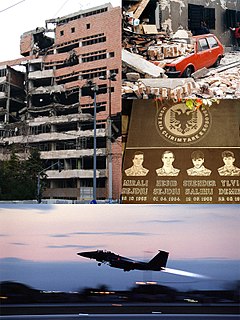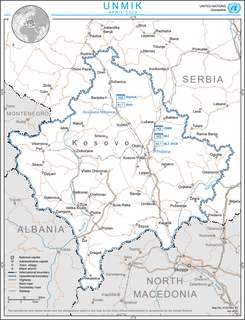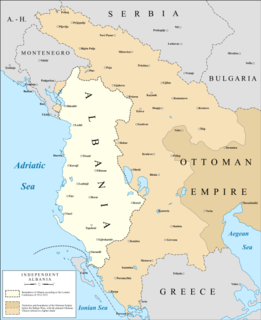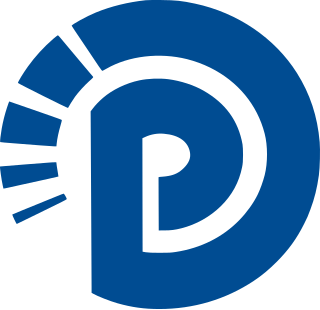Related Research Articles

Albania, officially the Republic of Albania, is a country in Southeastern Europe. It is located on the Adriatic and Ionian Seas within the Mediterranean Sea and shares land borders with Montenegro to the northwest, Kosovo to the northeast, North Macedonia to the east and Greece to the south. Tirana is its capital and largest city, followed by Durrës, Vlorë, and Shkodër.

The Kosovo War was an armed conflict in Kosovo that started 28 February 1998 and lasted until 11 June 1999. It was fought by the forces of the Federal Republic of Yugoslavia, which controlled Kosovo before the war, and the Kosovo Albanian rebel group known as the Kosovo Liberation Army (KLA). The conflict ended when the North Atlantic Treaty Organization (NATO) intervened by beginning air strikes in March 1999 which resulted in Yugoslav forces withdrawing from Kosovo.

Kosovo, officially the Republic of Kosovo, is a partially recognised state in Southeast Europe. It lies at the centre of the Balkans. Kosovo unilaterally declared its independence from Serbia on 17 February 2008, and has since gained diplomatic recognition as a sovereign state by 100 member states of the United Nations. It is bordered by Serbia to the north and east, North Macedonia to the southeast, Albania to the southwest, and Montenegro to the west. Most of central Kosovo is dominated by the vast plains and fields of Dukagjini and Kosovo field. The Accursed Mountains and Šar Mountains rise in the southwest and southeast, respectively. Its capital and largest city is Pristina.

Montenegro is a country in Southeastern Europe. It is located in the Balkans, and is bordered by Serbia to the northeast, Bosnia and Herzegovina to the north, Kosovo to the east, Albania to the southeast, Croatia to the northwest, and the Adriatic Sea to the west, with a coastline of 293.5 km. Podgorica, the capital and largest city, covers 10.4% of Montenegro's territory of 13,812 square kilometres (5,333 sq mi), and is home to roughly 30% of its total population of 621,000.

The United Nations Interim Administration Mission in Kosovo (UNMIK) is the officially mandated mission of the United Nations in Kosovo. The UNMIK describes its mandate as being to "help the United Nations Security Council achieve an overall objective, namely, to ensure conditions for a peaceful and normal life for all inhabitants of Kosovo and advance regional stability in the Western Balkans."
The foreign relations of Albania are its relations with other governments and peoples. Foreign relations are conducted through the Ministry of Foreign Affairs in Tirana. The current minister is Olta Xhaçka. The current Ambassador to the United Nations is Ferit Hoxha.

Romano Antonio Prodi is an Italian politician, economist, academic, senior civil servant, and business executive who served as the tenth president of the European Commission from 1999 to 2004. He served twice as Prime Minister of Italy, first from 18 May 1996 to 21 October 1998, and then from 17 May 2006 to 8 May 2008. Prodi is considered the founder of the Italian centre-left and one of the most prominent and iconic figures of the so-called Second Republic. He is often nicknamed Il Professore due to his academic career.

Sali Ram Berisha is an Albanian conservative politician and former cardiologist who served as the second President of Albania from 1992 to 1997 and Prime Minister from 2005 to 2013.

Edi Rama is an Albanian politician, painter, writer, former university lecturer, publicist and former basketball player, who has served as the 33rd and current Prime Minister of Albania since 2013 and chairman of the Socialist Party of Albania since 2005.

Greater Albania is an irredentist and nationalist concept that seeks to unify the lands that many Albanians consider to form their national homeland. It is based on claims on the present-day or historical presence of Albanian populations in those areas. In addition to the existing Albania, the term incorporates claims to regions in the neighbouring states, the areas include Kosovo, the Preševo Valley of Serbia, territories in southern Montenegro, northwestern Greece, and a western part of North Macedonia.

The Democratic Party of Albania is a conservative political party in Albania. It has been the largest opposition party in the country since 2013.

The Liberal Democratic Union is a political party in Albania.

State atheism is the incorporation of positive atheism or non-theism into political regimes. It may also refer to large-scale secularization attempts by governments. It is a form of religion-state relationship that is usually ideologically linked to irreligion and the promotion of irreligion to some extent. State atheism may refer to a government's promotion of anti-clericalism, which opposes religious institutional power and influence in all aspects of public and political life, including the involvement of religion in the everyday life of the citizen. In some instances, religious symbols and public practices that were once held by religion were replaced with secularized versions. State atheism can also exist in a politically neutral fashion, in which case it is considered as non-secular.

The Democratic League of Kosovo is the oldest and one of the largest political parties in Kosovo.

Ilir Rexhep Meta is an Albanian politician. He served as President of Albania from 24 July 2017 to 24 July 2022.

The Freedom Party, formerly known as the Socialist Movement for Integration, is a Social democratic political party in Albania. The party was formed on 6 September 2004, when Ilir Meta defected from the Socialist Party of Albania (PS). A proposal to change its logo, name and other symbols was unanimously approved at the party's National Convention (Congress) on 25 July 2022.
In 1991, the Socialist Party of Albania, with specific social democratic ideology took control of the country through democratic elections. One year later the Democratic Party of Albania won the new elections. After 1990, Albania has been seeking a closer relationship with the West. What followed were deliberate programs of economic and democratic reform, but Albanian inexperience with capitalism led to the proliferation of pyramid schemes – which were not banned due to the corruption of the government. Chaos in late 1996 to early 1997, as a result of the collapse of these pyramid schemes, alarmed the world and prompted the influx of international peacekeeping forces. In 1995, Albania was accepted into the Council of Europe and requested membership in NATO and is a potential candidate country for accession to the European Union. The workforce of Albania has continued to emigrate to Western countries, especially Greece and Italy.

The accession of North Macedonia to the European Union has been on the current agenda for future enlargement of the EU since 2005, when it became a candidate for accession. Macedonia submitted its membership application in 2004, thirteen years after its independence from Yugoslavia. It is one of seven current EU candidate countries, together with Albania, Moldova, Montenegro, Serbia, Turkey and Ukraine.

North Macedonia, officially the Republic of North Macedonia, is a country in Southeast Europe. It gained independence in 1991 as one of the successor states of Yugoslavia. It is a landlocked country bordering Kosovo to the northwest, Serbia to the north, Bulgaria to the east, Greece to the south, and Albania to the west. It constitutes approximately the northern third of the larger geographical region of Macedonia. Skopje, the capital and largest city, is home to a quarter of the country's 1.83 million people. The majority of the residents are ethnic Macedonians, a South Slavic people. Albanians form a significant minority at around 25%, followed by Turks, Romani, Serbs, Bosniaks, Aromanians and a few other minorities.

Slobodan Milošević was a Yugoslav and Serbian politician who served as the president of Serbia within Yugoslavia from 1989 to 1997 and president of the Federal Republic of Yugoslavia from 1997 to 2000. Formerly a high-ranking member of the League of Communists of Serbia (SKS) during the 1980s, he led the Socialist Party of Serbia from its foundation in 1990 until 2003.
References
- ↑ Robert Elsie (19 March 2010). Historical Dictionary of Albania. Scarecrow Press. p. 259. ISBN 978-0-8108-7380-3 . Retrieved 6 May 2016.
- ↑ "Albania Government 2001". CIA World Factbook. Retrieved 13 May 2007.
- 1 2 "Albania". Czech Summit:Participants. Archived from the original on 1 May 2007. Retrieved 13 May 2007.
- ↑ "Albania - Political profile". European Commission Enlargement Project. Archived from the original on 28 May 2007. Retrieved 13 May 2007.